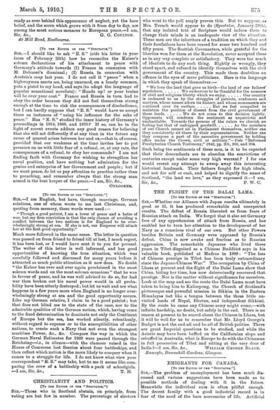CHRISTIANITY AND POLITICS.
[To THE EDITOR OP THE " SPROTLTOR.'1 Sin,—Those who in Scotland abstain, on principle, from voting are but few in number. The percentage of electors who went to the poll amply proves this. But to suppose, as Mrs. Trench would appear to do (spectator, January 29th),
that any isolated text of Scripture would induce them to change their minds is an inadequate view of the situation.
These men are the inheritors of a tradition on which they and
their forefathers have been reared for some two hundred and fifty years. The Scottish Covenanters, while grateful for the liberties won for them at the Revolution, never accepted these as in any way complete or satisfactory. They were too much of idealists to do any such thing. Rightly or wrongly, they stood apart, and refused to identify themselves with the civil government of the country. This made them doubtless an
offence in the eyes of mere politicians. Here is the language in which they speak of themselves:— "We love the land that gave us birth—the land of our fathers'
sepulchres We endeavour to be thankful for the measure of civil and religions liberty which we enjoy Our country
is endeared to us by the struggles of patriots, confessors and martyrs, whose names adorn its history, and whose monuments' are
scattered over its surface But we feel compelled to maintain the position of dissent from the civil government of
these lands We do not come to this decision lightly. Opponents will condemn the sentiment as unpatriotic and uncharitable. Towards the persons of the rulers we cherish no
feeling but that of unfeigned goodwill As the members of our Church cannot sit in Parliament themselves, neither can they consistently sit there by their representatives. Neither can they compose a part of the executive government by holding office under the Crown, civil or military."—Vide "Reformed Presbyterian Church Testimony," 1842, pp. 201, 203, and 204.
Such being the sentiments of these men, is it to be expected that their descendants are to abandon the convictions of centuries except under some very high warrant P I for one would resent any attempt to sweep away this interesting historical landmark. Their fathers fought for high ideals, and not for self or cash, and helped to dignify the name of Scotland, "the land we love," as they expressed it.—I am,














































 Previous page
Previous page